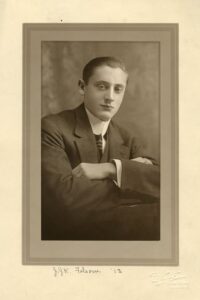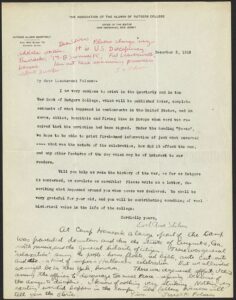November 11, 2018 is Veterans Day and marks the 100th anniversary of the Armistice that ended World War I. To commemorate this centennial, What Exit? will be featuring letters from Special Collections and University Archives’ Records of the Rutgers College War Service Bureau. This collection features letters from Rutgers students and alumni who served in the First World War, describing their experiences serving in the United States and overseas. Each day between November 1 and 11, Voices of the Armistice posts will share what these Rutgers students from 100 years ago had to say about the moment when peace was declared.

Joseph K. Folsom (class of 1913) was stationed at Camp Hancock in Augusta, Georgia, on November 11, 1918. When he received War Service Bureau director Earl Reed Silvers’s letter asking for information about “what happened around you when peace was declared.” Folsom wrote a brief paragraph on Silvers’s letter itself saying:
“At Camp Hancock a large part of the camp was paraded downtown and thro the streets of Augusta, Ga. with music, and the general hilarity of citizens. There was general ‘relaxation’ among the people—horns, floats, red lights, auto cut-outs and etc.—a kind of super-Halloween celebration. But we all wished we might be in New York, however. There was a general effort, I think among the officers to discourage too much peace-rejoicing, because of the danger to discipline. I know of nothing very striking. Nothing very exciting ever did happen in the camps. The fellows overseas will tell you the stories.”

After the war, Folsom became a professor of sociology at Vassar College in Poughkeepsie, New York. He died in 1960.
The Rutgers College War Service Bureau was formed in 1917 as a way to keep Rutgers men serving in the war in touch with Rutgers and each other. It was headed by Earl Reed Silvers (class of 1913), who was assistant to Rutgers president William Henry Steele Demarest. Thanks to a grant from the New Jersey Historical Commission, the letters are now available online.
Be sure to visit What Exit? between November 1 and 11 for new stories and follow highlights on Special Collections and University Archives’ Facebook and Twitter.
(With assistance from Tara Maharjan. Folsom photo from the Rutgers University Biographical Files: Alumni Collection.)